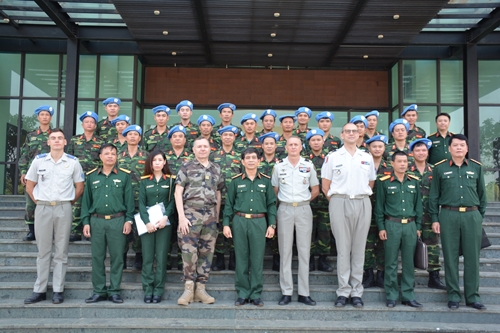Over the past three decades, the Western European country has trained hundreds of Vietnamese officials in different training forms. Vietnamese trainees have effectively applied knowledge acquired during training in France to their task performance in Vietnam, and many of them have become leading officials in their sectors.
Assoc. Prof., Dr., People’s Doctor Major General Pham Nguyen Son, Deputy Director of Military Central Hospital 108, is one of the typical examples. Son is one of the first 30 young doctors of the Military Central Hospital 108 to study in France under the country’s program on training Vietnamese military medical staff from 1995 to 2005. By working as interns at different military hospitals in Paris, Marseilles, and Metz, Vietnamese military doctors had opportunity to raise their professional competence. Now many of them have become leaders of the hospital and its departments.
    |
 |
|
French officers and Vietnamese peacekeepers in a joint photo at a training course in October, 2019 |
According to General Son, under a cooperation deal between Military Central Hospital 108 and France-based Foch Hospital, the hospital has sent 17 groups of doctors to study in France and invited French anesthesiologists to share their experience with Vietnamese medical staff.
Another example is Deputy Director of Military Central Hospital 108 Senior Colonel Nguyen Hoang Ngoc who studied in France in 2000. In more than one year working as an intern at Legouest Hospital in Metz, Ngoc delved into neuroscience and gathered materials for her doctoral thesis. Ngoc said that she received huge support from Professor F. Flocard - a leading French neurologist, and colleagues who were willing to create favorable condition for her to collect materials or participate in extra training courses on ultrasound.
Thanks to knowledge acquired during the time in France as well as valuable materials from French colleagues, Ngoc excellently defended her doctoral thesis.
Ngoc shared that she always feels lucky to have had the opportunity to approach France’s medical advances.
Like Colonel Ngoc, Senior Colonel Nguyen Minh Ly, Head of the Department of Anesthesiology and Resuscitation of Military Central Hospital 108, studied in France for years. During the time, Colonel Ly learned from French doctors’ experience in taking care of patients after surgery.
Apart from providing training for Vietnamese military doctors, France, as a permanent member of the United Nations Security Council, has actively helped Vietnam in its participation in the U.N. peacekeeping operations.
French Ambassador to Vietnam Nicolas Warnery said that France is always willing to give more support to Vietnam in this field. Over the past time, the country has sent its experts to share their understanding and knowledge of peacekeeping to personnel of the Vietnam Department of Peacekeeping Operations.
According to the ambassador, within a project of the European Union, a French officer has been working at the Vietnam Department of Peacekeeping Operations since 2019.
Talking about Vietnam-France cooperation in U.N. peacekeeping operations, Director of the Vietnam Department of Peacekeeping Operations Major General Hoang Kim Phung said that the two countries are fostering their cooperation in training and exchange of professional knowledge to raise peacekeepers’ command of foreign languages and professional competence. He recalled that the two sides hosted six events for military engineering and medical forces to share their professional knowledge and three French language classes at the Vietnam Department of Peacekeeping Operations in 2020.
“As the COVID-19 pandemic is still developing complicatedly, this is an encouraging outcome of Vietnam-France defense cooperation,” said Major General Hoang Kim Phung.
General Phung said that since French is one of the key languages of the U.N., it is very important for U.N. peacekeepers to have good command of the language. According to the U.N.’s statistics, around two thirds of the personnel of U.N. peacekeeping missions are using French to communicate with local people and their colleagues. In other words, having a good command of French and English will help peacekeepers, especially those working in African countries like the Central African Republic and Mali, better collect information and deal with issues in a timely and effective manner.
Mentioning Lieutenant Colonel Nguyen Duy Quang, who excellently fought off stiff competition from representatives from 125 countries to become a U.N. Military Coordinator on peacekeeping operations between the U.N. Mission in the Central African Republic and the Central African Republic Government, General Phung said that this success came partly from Quang’s good command of foreign languages, including French.
With its thorough preparation of personnel, Vietnam is highly appreciated and entrusted by the U.N. and entrusted with important positions, according to Phung.
It is clear that cooperation in training between Vietnam’s Ministry of National Defense and France’s Ministry of Armed Forces have achieved important results. Cooperation in this field is considered as the key for the two countries to promote their relations in military medicine, hydrology, U.N. peacekeeping operations, defense industry and cyber security.
Translated by Tran Hoai